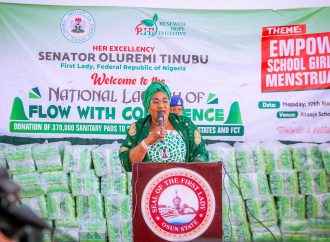Bank of Agriculture Secures $200 Million Livelihood Support Fund for Displaced Nigerians The Bank of Agriculture (BOA) has announced the establishment of a $200 million Livelihood Support Fund aimed at improving the living conditions of millions of displaced Nigerians affected by insurgency, natural disasters, and communal conflicts across the country. The fund, which is being
Bank of Agriculture Secures $200 Million Livelihood Support Fund for Displaced Nigerians
The Bank of Agriculture (BOA) has announced the establishment of a $200 million Livelihood Support Fund aimed at improving the living conditions of millions of displaced Nigerians affected by insurgency, natural disasters, and communal conflicts across the country.

The fund, which is being supported by international development partners and local financial institutions, is designed to provide low-interest loans, grants, and capacity-building programs for internally displaced persons (IDPs) and rural dwellers seeking to rebuild their livelihoods.
Tanzania’s First Female President Samia Suluhu Seeks Re-election Amid Crackdown On Opposition
According to the Managing Director of the Bank, Alhaji Kabir Adamu, the initiative represents one of the most comprehensive post-conflict recovery efforts ever undertaken by a Nigerian financial institution. He stated that the $200 million facility will focus primarily on agricultural production, small-scale enterprises, and women-led businesses in conflict-affected areas.
“This fund is a direct response to the growing number of Nigerians who have been forced out of their homes due to insecurity, flooding, and climate-related challenges,” Adamu said. “We want to restore their dignity by providing access to finance, tools, and training so they can rebuild their lives and contribute to national productivity.”
Implementation Strategy
The BOA explained that the Livelihood Support Fund will be implemented in three phases over a period of five years. The first phase, beginning in early 2026, will target displaced persons in the North-East and North-Central regions, where insurgency and banditry have severely disrupted farming and trade.
Beneficiaries will receive microloans ranging from ₦200,000 to ₦2 million, depending on their project type and repayment capacity. The loans will attract a single-digit interest rate and a flexible repayment plan tailored to agricultural seasons.
The second phase will extend to communities affected by flooding and desertification in the South-South and North-West regions, while the final phase will include livelihood restoration projects in the Middle Belt and border communities.
The BOA also plans to collaborate with the National Commission for Refugees, Migrants and Internally Displaced Persons (NCFRMI), the Federal Ministry of Humanitarian Affairs, and state governments to ensure transparent beneficiary selection and efficient fund disbursement.
Support from Development Partners
The $200 million fund is backed by a consortium of international donors, including the African Development Bank (AfDB), the International Fund for Agricultural Development (IFAD), and the Islamic Development Bank (IsDB). These partners will provide both financial and technical assistance to strengthen the capacity of beneficiaries in entrepreneurship and sustainable farming practices.
A senior AfDB representative in Nigeria, Dr. Mariama Diallo, said the Bank’s involvement is part of its regional commitment to enhancing food security and rebuilding rural economies devastated by conflict.
“We believe Nigeria’s displaced populations can become productive contributors to national development if given the right support. This fund is a step toward inclusive recovery and economic resilience,” Diallo noted.
Focus on Women and Youth Empowerment
The BOA emphasized that at least 40% of the fund will be allocated to women and youth, who are among the most vulnerable groups in displacement camps. Training programs on agribusiness management, digital finance, and cooperative formation will accompany the financial assistance to ensure sustainability.
Women-led cooperatives will also have access to seed grants to establish small agro-processing centers for rice, groundnut, and shea butter production — key sectors with potential for rural job creation.
Transparency and Monitoring
To prevent misuse of funds, the BOA said it will deploy a digital monitoring platform that tracks loan disbursement, project progress, and repayment schedules. The system will allow beneficiaries to receive funds directly into verified accounts and submit progress reports via mobile applications.
Independent auditors and civil society organizations will also be engaged to provide oversight and ensure compliance with international best practices.
National Impact
Analysts have described the Livelihood Support Fund as a significant boost to Nigeria’s humanitarian response and agricultural recovery efforts. With millions of Nigerians displaced by insecurity and natural disasters, the program is expected to revitalize local economies, reduce dependency on aid, and promote long-term peacebuilding.
The initiative aligns with the Federal Government’s Renewed Hope Agenda on poverty reduction and rural transformation, which seeks to create inclusive economic opportunities for all Nigerians.
“This initiative has the potential to restore hope and stability in some of the most fragile parts of the country,” said Dr. Amina Sule, an economist and policy analyst. “If implemented transparently, it could become a model for other African nations facing similar challenges.”
The Bank of Agriculture reiterated its commitment to supporting displaced families, farmers, and small-scale entrepreneurs, assuring that the $200 million Livelihood Support Fund will not only rebuild livelihoods but also reignite economic activity in Nigeria’s most vulnerable communities.



















Leave a Comment
Your email address will not be published. Required fields are marked with *